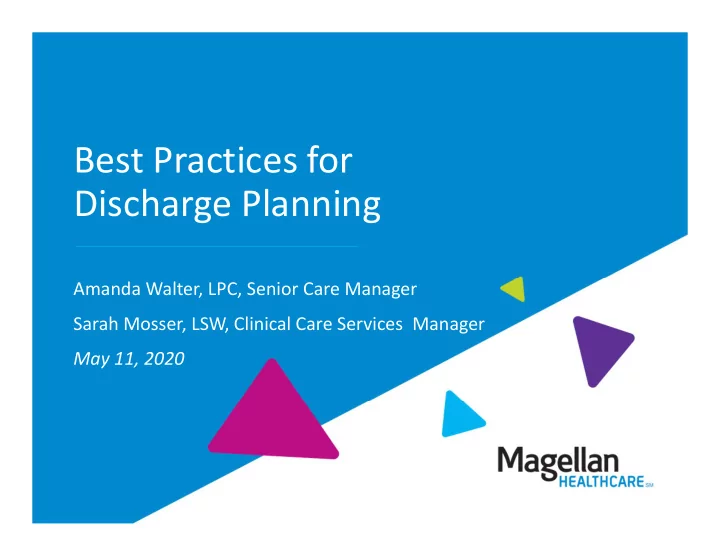

Best Practices for Discharge Planning Amanda Walter, LPC, Senior Care Manager Sarah Mosser, LSW, Clinical Care Services Manager May 11, 2020
Our Massive Transformational Purpose Our Vision Our Mission Sparking innovation to build healthier and Magellan guides individuals to make better brighter futures. decisions, and live healthier and more fulfilling lives, by improving the overall quality and affordability of healthcare.
What are the Best Practices for Discharge Planning? Start Discharge planning immediately Give families voice and choice and think outside the box Understand language preferences Consider Social Determinants of Health Clear information about medications; develop a plan to obtain them Make sure Medical Necessity Criteria is met for the level of care you are referring the family to Collaboration with providers Revisit the crisis plan Create a calendar Provide a typed discharge plan 4
A Closer look at the Best Practices 5
A Discharge Summary is not a Discharge Plan Discharge summaries examine clinical aspects of the Family Based Treatment. Discharge summaries are intended for providers. Discharge plans are for the individual. Discharge plans provide information needed for the days/weeks/months following the ending of Family Based Treatment. Discharge plans are easily understood, even for individuals with limited health literacy. Discharge plans are printed out and given to the family at/before the final session.
Components of a Discharge Plan • Cover page (individual’s name, • Medication information including drug discharge date, home address, phone name, dose schedule and reason for number, emergency contact person). the medication. • Agency contact including phone • Community Connections. number. • Crisis Plan. • Aftercare appointments. • Language assistance needs. • Appointments for follow-up (medical, lab work, specialist). 7
Discharge Planning • Discharge planning should begin immediately and continue throughout the Family Based authorization. • Thorough discharge planning prepares individuals and their families for discharge success. • Discharge planning should address the needs of all family members. • The Family Based team collaborates with the individual and family about their specific aftercare needs. • Use creativity to identify informal/natural supports. • Talk about barriers that people could experience after discharge. 8
Language Preference Discover the individual and family’s preferred language. Inquire about oral communication, phone communication and written communication. Obtain language assistance for the individual/family to ensure full participation in treatment and planning. Provide the discharge plan in the individual/family’s preferred language. Schedule aftercare services with providers who have appropriate linguistic and cultural competence . 9
Social Determinants of Health There are seven primary social need 1. Food Insecurity: Limited or uncertain domains to consider when developing a access to adequate and nutritious food. discharge plan. 2. Housing Instability: Homelessness, Have open dialogue with the patient and frequent housing disruptions, eviction. ask questions about Social Determinants 3. Utility Needs: shut off notices. of Health. 4. Financial Resource Strain: financial literacy, medication under-use due to cost. 5. Transportation: Difficulty accessing or affording transportation. 6. Exposure to Violence: Intimate partner violence, community violence. 7. Socio-Demographic Information. 10
Medications • List all medications prescribed with drug name, dosage, dosing schedule and reason for the medication. • Include information about the individual’s pharmacy, including name, address and telephone number. • Include information about the individual’s next medication management appointment, including provider’s name, address, and telephone number. • If the individual will need to transition to a new psychiatrist, support the individual with accessing this service. Create a plan with the current prescriber if there are barriers to connecting to a new provider. 11
Aftercare Planning • Consider the needs of all family members, not just the individual • Make sure MNC is met for the level of care you are referring the individual/family to https://www.magellanofpa.com/for-providers/provider-resources/medical-necessity-criteria/ • Make timely referrals • Consider community-based supports including Case Management, Certified Peer Support, HiFi Wraparound and others. • Think outside the box 12
Things not to do when Discharge Planning • Ask for an extension because you ran out of time with planning • Only refer to your own agency • Only consider BHRS or Outpatient • Place the family on a waiting list • Ignore a family’s culture or language preference 13
Collaboration Services can overlap for up to 30 days prior to Family Based discharge Have at least four sessions with the new provider Ask the individual/family “is this therapist a good fit for you?” Collaborate with the aftercare services, including providing them with a discharge summary Aftercare providers need to know about important clinical information and ongoing treatment issues. 14
Revisiting the Crisis Plan A Crisis Plan is an important part of the discharge plan. Revisit the previous plan – are the components still relevant for the individual/family? Revise as needed to reflect new coping skills and supports. List the names and phone numbers of people that the individual/family can call for help. Include information about local crisis services and toll-free hotlines in the written Discharge Plan. 15
Create a Calendar Develop a calendar for the first month after discharge. Print out the calendar and include with the Discharge Plan. Include dates/times of all appointments as well as special dates for the individual/family. This activity is very helpful to assist individuals/families to visualize and prepare for the time immediately following discharge from FBS. 16
Questions and Comments Amanda Walter, LPC, Senior Care Manager Magellan Behavioral Health of Pennsylvania 215-504-3900 x63843 ajwalter@magellanhealth.com Sarah Mosser, LSW, Clinical Care Services Manager Magellan Behavioral Health of Pennsylvania 215-504-3900 x63827 sjmosser@magellanhealth.com 17
Confidentiality statement The information presented in this presentation is confidential and expected to be used solely in support of the delivery of services to Magellan members. By receipt of this presentation, each recipient agrees that the information contained herein will be kept confidential and that the information will not be photocopied, reproduced, or distributed to or disclosed to others at any time without the prior written consent of Magellan Health, Inc.
Recommend
More recommend